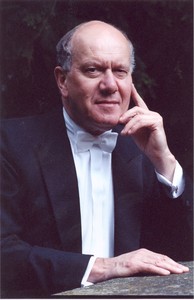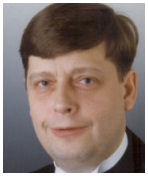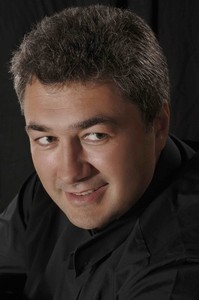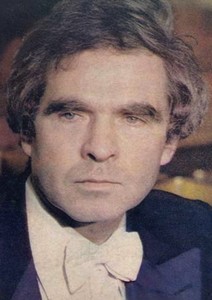
John Lill |
John Lill

John Lill rose to the highest step of the podium at the IV International Tchaikovsky Competition in Moscow in 1970 together with Vladimir Krainev, leaving behind many gifted pianists and without causing any special disagreements between the jury members, nor traditional disputes between the judges and the public. Everything seemed natural; despite his 25 years, he was already a mature, largely established master. It was this impression that his confident playing left, and to confirm it, it was enough to look at the competition booklet, which reported, in particular, that John Lill has a really fantastic repertoire – 45 solo programs and about 45 concerts with an orchestra. In addition, one could read there that by the time of the competition he was no longer a student, but a teacher, even a professor. Royal College of Music. It turned out to be unexpected, perhaps, only that the English artist had never tried his hand at competitions before. But he preferred to decide his fate “with one blow” – and as everyone was convinced, he was not mistaken.
For all that, John Lill did not come to the Moscow triumph along a smooth road. He was born into a working-class family, grew up in the London suburb of the East End (where his father worked in a factory) and, having shown musical talent in early childhood, for a long time did not even have his own instrument. The development of the talent of a purposeful young man, however, proceeded exceptionally quickly. At the age of 9, he performed with an orchestra for the first time, playing the Second Concerto of Brahms (by no means a “childish” work!), At 14, he knew almost all of Beethoven by heart. Years of study at the Royal College of Music (1955-1965) brought him many different distinctions, including the D. Lipatti Medal and the Gulbenkian Foundation Scholarship. An experienced teacher, head of the organization “Musical Youth” Robert Mayer helped him a lot.
In 1963, the pianist made his official debut at the Royal Festival Hall: Beethoven’s Fifth Concerto was performed. However, as soon as he graduated from college, Lill was forced to devote a lot of time to private lessons – it was necessary to earn a living; he soon received a class at his alma mater. Only gradually did he begin to actively give concerts, first at home, then in the USA, Canada and a number of European countries. One of the first to appreciate his talent was Dmitri Shostakovich, who heard Lill perform in Vienna in 1967. And three years later Mayer persuaded him to take part in the Moscow competition …
So the success was complete. But still, in the reception that the Moscow public gave him, there was a certain chill of wariness: he did not cause such noisy delights that the romantic excitement of Cliburn, the stunning originality of Ogdon, or the charm of youth emanating from G. Sokolov had previously caused. Yes, everything was right, everything was in place, ”but something, some kind of zest, was missing. This was also noticed by many experts, especially when competitive excitement subsided and the winner went on his first trip around our country. A fine connoisseur of piano playing, critic and pianist P. Pechersky, paying tribute to Lill’s skill, clarity of his ideas and ease of playing, noted: “The pianist does not“ work ”neither physically nor (alas!) emotionally. And if the first conquers and delights, then the second discourages … Still, it seems that John Lill’s main victories are yet to come, when he manages to add more warmth to his smart and honed skills, and when necessary – and heat.
This opinion as a whole (with various shades) was shared by many critics. Among the merits of the artist, the reviewers attributed “mental health”, the naturalness of creative excitement, sincerity of musical expression, harmonic balance, “major overall tone of the game.” It is these epithets that we will encounter when we turn to reviews of his performances. “Once again I was struck by the skill of the young musician,” wrote the magazine “Musical Life” after Lill performed Prokofiev’s Third Concerto. “Already his confident technique is capable of delivering artistic pleasure. And powerful octaves, and “heroic” leaps, and seemingly weightless piano passages …
About thirty years have passed since then. What is remarkable about these years for John Lill, what new things did they bring to the artist’s art? Outwardly, everything continues to develop safely. The victory at the competition opened the doors of the concert stage even wider for him: he tours a lot, recorded almost all of Beethoven’s sonatas and dozens of other works on records. At the same time, in essence, time has not added new features to the familiar portrait of John Lill. No, his skill has not faded. As before, as many years ago, the press pays tribute to his “rounded and rich sound”, strict taste, careful attitude to the author’s text (rather, however, to its letter than to its spirit). Lill, in particular, never cuts and performs all the repetitions, as prescribed by the composer, he is alien to the desire to exploit cheap effects, playing for the audience.
“Since music for him is not only the embodiment of beauty, not only an appeal to feeling and not only entertainment, but also the expression of truth, he treats his work as the embodiment of this reality without compromising cheap tastes, without alluring mannerisms of any kind.” wrote the Record and Recording magazine, celebrating the 25th anniversary of the artist’s creative activity on the days when he turned 35!
But at the same time, common sense often turns into rationality, and such “business pianism” does not find a warm response in the audience. “He does not let music get any closer to him than he thinks it is acceptable; he is always with her, in all cases on you, ”said one of the English observers. Even in reviews of one of the artist’s “crown numbers” – Beethoven’s Fifth Concerto, one can come across such definitions: “courageously, but without imagination”, “disappointingly uncreative”, “unsatisfactory and frankly boring”. One of the critics, not without irony, wrote that “Lill’s game is somewhat similar to a literary essay written by a school teacher: everything seems to be correct, thought out, exactly in form, but it is devoid of that spontaneity and that flight, without which creativity is impossible, and integrity in separate, well-executed fragments. Feeling some lack of emotionality, natural temperament, the artist sometimes tries to artificially compensate for this – he introduces elements of subjectivism into his interpretation, destroys the living fabric of music, goes against himself, as it were. But such excursions do not give the desired results. At the same time, Lill’s latest records, in particular the recordings of Beethoven’s sonatas, give reason to speak of a desire for the depth of his art, for greater expressiveness of his playing.
So, the reader will ask, does it mean that John Lill has not justified the title of the winner of the Tchaikovsky Competition yet? The answer is not so simple. Of course, this is a solid, mature and intelligent pianist who has entered the time of his creative flourishing. But its development over these decades has not been as rapid as before. Probably, the reason is that the scale of the artist’s individuality and its originality do not fully correspond to his musical and pianistic talent. Nevertheless, it is too early to draw final conclusions – after all, the possibilities of John Lill are far from being exhausted.
Grigoriev L., Platek Ya., 1990
John Lill is unanimously recognized as one of the leading pianists of our time. During his almost half-century career, the pianist has traveled to more than 50 countries with solo concerts and performed as a soloist with the best orchestras in the world. He was applauded by the concert halls of Amsterdam, Berlin, Paris, Prague, Rome, Stockholm, Vienna, Moscow, St. Petersburg, cities of Asia and Australia.
John Lill was born March 17, 1944 in London. His rare talent manifested itself very early: he gave his first solo concert at the age of 9. Lill studied at the Royal College of Music in London with Wilhelm Kempf. Already at the age of 18, he performed Rachmaninov’s Concerto No. 3 with an orchestra conducted by Sir Adrian Boult. A brilliant London debut soon followed with Beethoven’s Concerto No. 5 at the Royal Festival Hall. In the 1960s, the pianist won numerous awards and prizes at prestigious international competitions. The highest achievement of Lill is the victory at the IV International Competition named after. Tchaikovsky in Moscow in 1970 (shared the XNUMXst prize with V. Krainev).
Lill’s widest repertoire includes more than 70 piano concertos (all concertos by Beethoven, Brahms, Rachmaninov, Tchaikovsky, Liszt, Chopin, Ravel, Shostakovich, as well as Bartok, Britten, Grieg, Weber, Mendelssohn, Mozart, Prokofiev, Saint-Saens, Frank, Schumann ). He became famous, in particular, as an outstanding interpreter of the works of Beethoven. The pianist performed a full cycle of his 32 sonatas more than once in Great Britain, the USA and Japan. In London he has given over 30 concerts at the BBC Proms and regularly performs with the country’s major symphony orchestras. Outside the UK, he has toured with the London Philharmonic and Symphony Orchestras, the Air Force Symphony Orchestra, the Birmingham, Halle, Royal Scottish National Orchestra and the Scottish Air Force Symphony Orchestra. In the USA – with the symphony orchestras of Cleveland, New York, Philadelphia, Dallas, Seattle, Baltimore, Boston, Washington DC, San Diego.
The pianist’s recent performances include concerts with the Seattle Symphony, the St Petersburg Philharmonic, the London Philharmonic and the Czech Philharmonic. In the 2013/2014 season, in commemoration of his 70th birthday, Lill played the Beethoven sonata cycle in London and Manchester, and performed recitals at the BenaroyaHall in Seattle, the Dublin National Concert Hall, the Great Hall of the St. Petersburg Philharmonic, and toured the UK with the Royal Philharmonic Orchestra (including performances at the Royal Festival Hall), debuted with the Beijing National Performing Arts Center Orchestra and the Vienna Tonkunstler Orchestra. Played again with the Halle Orchestras, the National Band of the Air Force for Wales, the Royal Scottish National Orchestra and the Bournemouth Symphony Orchestra.
In December 2013, Lill performed in Moscow at the Vladimir Spivakov Invites… festival, performing all five Beethoven Piano Concertos in two evenings with the National Philharmonic Orchestra of Russia conducted by Vladimir Spivakov.
Numerous recordings of the pianist have been made on the labels DeutscheGrammophon, EMI (a complete cycle of Beethoven’s concertos with the Royal Scottish Orchestra conducted by A. Gibson), ASV (two Brahms concertos with the Halle Orchestra conducted by J. Lachran; all Beethoven sonatas), PickwickRecords (Concerto No. 1 by Tchaikovsky with the London Symphony Orchestra conducted by J. Judd).
Not so long ago, Lill recorded the complete collection of Prokofiev’s sonatas on ASV; the complete collection of Beethoven’s concertos with the Birmingham Orchestra conducted by W. Weller and his bagatelles on Chando; M. Arnold’s Fantasy on a Theme by John Field (dedicated to Lill) with the Royal Philharmonic Orchestra conducted by W. Hendley on Conifer; all of Rachmaninov’s concertos, as well as his most famous solo compositions on Nimbus Records. John Lill’s latest recordings include works by Schumann on the Classicsfor Pleasure label and two new albums on Signumrecords, including sonatas by Schumann, Brahms and Haydn.
John Lill is an honorary doctor of eight universities in the UK, an honorary member of leading music colleges and academies. In 1977 he was awarded the title of Officer of the Order of the British Empire, and in 2005 – Commander of the Order of the British Empire for services to the art of music.





